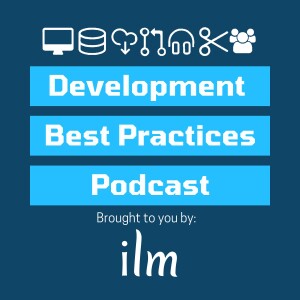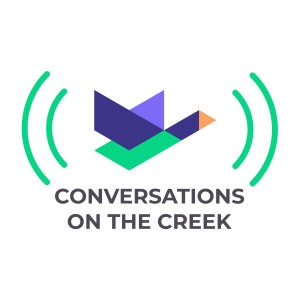

Development Best Practices
https://feeds.buzzsprout.com/1890077.rssEpisode List

20: Web Performance - Feel the Need for Speed
In this episode we welcome back Robert Boedigheimer, Microsoft MVP, Pluralsight Author and MDC Speaker to talk about web performance. Robert talks through his surprising answer to the biggest problems in quickly loading web pages, how FAST to load a web page, and some ways to benchmark web pages. We conclude with a discussion of HTTP/1.1 vs. HTTP/2.0.2:00 Best Practices - Negotiating with silence4:45 The biggest problems in quickly loading web pages6:55 When to load 3rd party content7:55 What IS a "fast" web page?9:35 Best tools to benchmark web pages12:40 HTTP/1.1 vs HTTP/2HTTP Archive: https://httparchive.org/, https://www.speedcurve.com/blog/ten-years-page-bloat/Core Web Vitals: https://web.dev/vitals/Lighthouse Speed Index: https://web.dev/speed-index/RUM vendors : https://www.dynatrace.com/, https://www.speedcurve.com/Pagespeed Insights: https://pagespeed.web.dev/Page Speed Benchmarks: https://app.speedcurve.com/benchmarks/usa/retail/slow/speedindex/WebPageTest: https://www.webpagetest.org/Fiddler: https://www.telerik.com/fiddlerHTTP/1.1 vs. HTTP/2: https://www.httpvshttps.com/Find Robert at @boedie on Twitter.The Development Best Practices Podcast is brought to you by ILM Professional Services. Creating performant web applications is not simple, particularly if this is something you don't do regularly. ILM does a LOT of work creating highly performant web applications - applications that load fast and safely. We'd love to help you - please reach out to us at ilmservice.com so we can discuss how.Finally, if you like what you heard today, please tell a friend about us. If you have any feedback on this episode or have a topic you'd like us to cover, please email us at podcast@ilmservice.com.

19: Azure Cognitive Services: The Cool and the Creepy
After a wonderful summer break, it's time for Episode Nineteen of the Development Best Practices podcast, brought to you by ILM Professional Services. In this episode we continue our talk with Sam Nasr, Microsoft MVP and Organizer of the Cleveland .NET User Group, about Azure Cognitive Services. Sam talks through the cool and the creepy in cognitive services in general, as well as pricing and how you can get feedback to Azure on errors or improvements to be made.1:15 How creepy is face detection?2:40 Best practices in data set size4:15 Our biggest "wow" moments in cognitive services6:45 Success stories9:20 Azure Cognitive Services pricing model10:45 Getting feedback to Microsoft11:45 GIGO and responsible usageAzure Cognitive Services: https://azure.microsoft.com/en-us/services/cognitive-services/#apiResponsible AI investments and safeguards for facial recognition: https://azure.microsoft.com/en-us/blog/responsible-ai-investments-and-safeguards-for-facial-recognition/ Azure Cognitive Services support and help options: https://docs.microsoft.com/en-us/azure/cognitive-services/cognitive-services-support-optionsAll Sam's contact Links: https://linktr.ee/samnasrThe Development Best Practices Podcast is brought to you by ILM Professional Services. Sam talked about how, like with so much in the development world, the response to many Azure Cognitive Services questions is "It Depends". This is where the truly great consultants excel. If a consultant gives you a cookie cutter answer, you should expected a lot of crummy results. A good consultant will say "it depends" and then LISTENS, creating a custom solution for you. That's what we do at ILM - you'll never get a cookie-cutter solution. Please visit ilmservice.com today to find out why, and how to work with some of our consultants!Oh, and as we're about to leave our teens in the episode count, I am so grateful for the feedback and topic suggestions we've received. If YOU have any feedback on this episode, want to suggest a topic, or need anything else, please email us at podcast@ilmservice.com.Thanks for listening, and have a great day!

18: Azure Cognitive Services: Introduction, Examples, and Training your Data Model
Development Best Practices is old enough to vote! In this 18th episode we're talking Azure Cognitive Services with Sam Nasr, Microsoft MVP and leader of the Cleveland .NET User Group. Sam gives a good overview of what's happening within the multiple areas of Azure Cognitive Services, an example using LUIS, and best practices in training, and re-training, your data model.2:45 Best practices in training3:35 Cognitive Services in a nutshell5:10 Azure portals for each service5:55 Language Understanding (LUIS) example8:20 Using the services without deep knowledge9:30 Calling the service using REST10:20 Best practices in training (and re-training) your data model12:25 Cognitive Services - what data do you get?Please be sure to listen in a few weeks to Part II of our discussion with Sam, where he'll talk about his experiences, so far, with using cognitive services and his favorite WOW moment. He'll then share some success stories that he's seen so far and talk through pricing.The Development Best Practices Podcast is brought to you by ILM Professional Services. Do you have a need to use a cognitive service like natural language processing and want some help from an experienced developer in using this service? ILM can help. Please visit ilmservice.com today.If you have any feedback on this episode or have a topic you'd like us to cover, please email us at podcast@ilmservice.com.Thanks for listening, and have a great day!

17: Cosmos DB: Pricing, Optimization, and Thinking Differently
In this episode we'll be continuing our talk with Mike Benkovich, Microsoft Azure MVP and Azure Cloud Engineer, about Cosmos DB. If you haven't listened to Episode Sixteen of our podcast on Cosmos DB, I would encourage you to do so before listening to this one. In that episode, Mike talks through the basics of Cosmos DB and details on when, and when not to, use it.In this episode, Mike dives into pricing and performance optimization, as well as RUs and serverless.1:10 Cosmos DB pricing explanation (and risk)2:40 Performance optimization to reduce cost5:15 How paying by RUs works in a popular website6:25 Provisioning RUs in advance7:55 Cosmos DB Serverless9:40 Think DifferentlyMike's 5 minutes to {code} videos: https://www.benkotips.com/5minSpecial thanks to Josie Bigler for his help in preparing for this podcast.The Development Best Practices Podcast is brought to you by ILM Professional Services. Mike talked about Cosmos DB pricing and the importance of performance optimization to reduce cost. There's a large opportunity for some costly mistakes. If you want another pair of experienced eyes on this, ILM can help. Performance Optimization is something we take pride in, and have decades of experience doing - in Cosmos DB, other Azure tools, or .NET and frontend applications. Please visit ilmservice.com today to you'd like some help!As always, if you have any feedback on our episode, want to suggest a topic, or need anything else, please email us at podcast@ilmservice.com.

16: Cosmos DB: The basics, horror stories, and sourdough bread
In this episode we welcome Mike Benkovich, Microsoft Azure MVP and Azure Cloud Engineer, to talk about Azure Cosmos DB. Mike talks through the basics of Cosmos DB: what it is and why it's not just NoSQL. Then Mike goes a bit deeper into WHEN to use NoSQL vs a relational database, then when NOT to use Cosmos DB. We'll conclude with some Cosmos DB success and horror stories and a bit about Azure Storage tables.2:50 Best Practices in sourdough bread proofing4:00 Cosmos DB - what is it?5:35 It's not JUST NoSQL6:15 When to use NoSQL vs Relational DB8:27 When NOT to use Cosmos DB9:15 Cosmos DB success stories10:30 Cosmos DB horror stories11:40 Azure Storage Account tablesMike is a frequent speaker, including at the Twin Cities .NET User Group and the Minnesota Developers Conference, Mike is always willing to work with others to drive understanding and implementation of Azure technologies. Please be sure to listen in a few weeks to Part II of our Cosmos DB discussion with Mike where we'll talk about RUs, performance optimization, and Cosmos DB serverless. In the meantime, check out his great work at https://benkotips.com!The Development Best Practices Podcast is brought to you by ILM Professional Services. Do you have a relational database and want to look into the advantages of moving to Cosmos DB? Or maybe you already have Cosmos DB and need to figure out how to optimize it. In either case, ILM can help. Please visit ilmservice.com today to get some help.If you have any feedback on this episode or have a topic you'd like us to cover, please email us at podcast@ilmservice.com.Thanks for listening, and have a great day!
Create Your Podcast In Minutes
- Full-featured podcast site
- Unlimited storage and bandwidth
- Comprehensive podcast stats
- Distribute to Apple Podcasts, Spotify, and more
- Make money with your podcast












